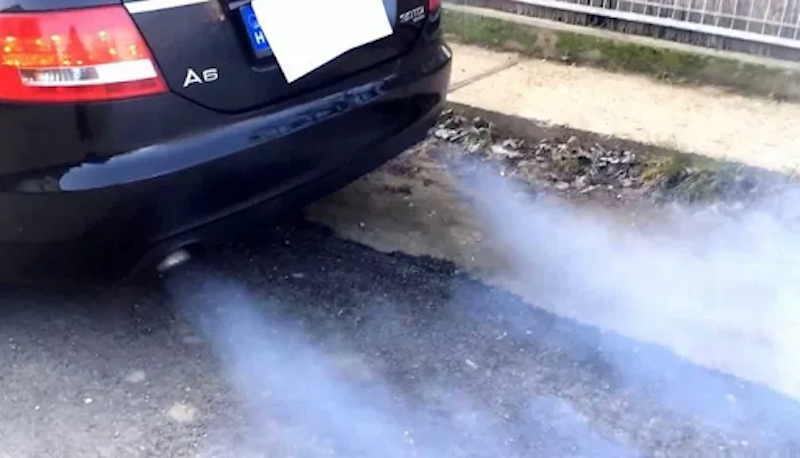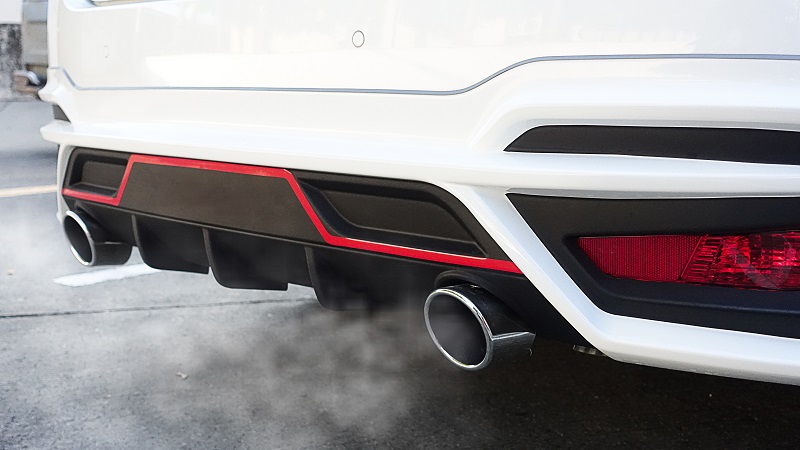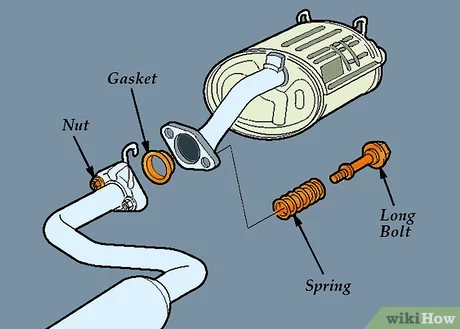How to Fix Blue Smoke from Exhaust
To fix blue smoke from exhaust, check and replace worn piston rings or valve stem seals. Blue smoke from your vehicle’s exhaust can be an indication of underlying issues that need attention.
Understanding the possible causes and necessary solutions can help you address the problem effectively. By following a few simple steps, you can troubleshoot and fix the blue smoke emission, ensuring your vehicle runs smoothly and efficiently. Identifying the root cause, such as worn piston rings or faulty valve stem seals, is crucial.
Addressing these issues promptly will prevent further damage to your engine and ensure optimal performance. Proper maintenance and timely repairs are key to keeping your vehicle in top condition and minimizing emissions that can harm both your car and the environment.

Credit: dailyinfographic.com
Common Causes Of Blue Smoke
Blue smoke coming from the exhaust of your vehicle can be a troubling sight. It is a clear indication of potential issues with the engine. Understanding the common causes of blue smoke is essential for identifying the problem and taking the necessary steps to fix it.
Worn Piston Rings
Worn piston rings are a common culprit of blue smoke from the exhaust. When piston rings wear out, engine oil can seep into the combustion chamber and burn along with the fuel. This results in blue smoke being emitted from the tailpipe. If you notice blue smoke, it’s important to have the piston rings inspected by a qualified mechanic.
Faulty Valve Seals
Faulty valve seals can also lead to the emission of blue smoke. The valve seals are responsible for keeping oil from entering the combustion chamber. If they become worn or damaged, oil can leak into the chamber during the engine’s operation, causing the characteristic blue smoke. Having the valve seals replaced by a professional is crucial in addressing this issue.
Steps To Diagnose The Issue
Make sure to check oil levels regularly to identify any excessive oil consumption.
Examine the spark plugs for black oily residue, indicating oil burning in the combustion chamber.
Conduct a compression test on each cylinder to assess engine performance and potential issues.
Methods To Fix Blue Smoke
Repairing Piston Rings
Inspect and replace worn piston rings to prevent oil leakage.
Replacing Valve Seals
Install new valve seals to eliminate oil seepage into the combustion chamber.
Using Oil Additives
Employ oil additives designed to reduce oil consumption and minimize blue smoke.

Credit: grimmermotors.co.nz
Preventive Measures
When it comes to preventing blue smoke from the exhaust, taking proactive measures to maintain your vehicle is essential. By following these preventive measures, you can help avoid potential issues and keep your engine running smoothly.
Regular Oil Changes
Regular oil changes are crucial to prevent blue smoke from the exhaust. Engine oil lubricates moving parts and helps to maintain proper engine temperature. Over time, oil breaks down and can lead to seal and gasket leaks, which can result in blue smoke emission. By changing the oil at regular intervals, you can ensure that the engine components remain properly lubricated and reduce the risk of blue smoke.
Proper Engine Maintenance
Proper engine maintenance is key to preventing blue smoke from the exhaust. This includes regular inspection of the engine components, such as the piston rings, valve seals, and cylinder walls. By addressing any issues promptly and maintaining the engine in good working condition, you can minimize the risk of blue smoke emission.
When To Seek Professional Help
If you notice blue smoke coming from your exhaust, it’s important to seek professional help for a fix. Addressing this issue early can prevent further damage to your vehicle.
Persistent Blue Smoke
If you have noticed persistent blue smoke coming out of your car’s exhaust, it is essential to address the issue promptly. Blue smoke is an indication that your engine is burning oil, which can lead to various problems if left untreated. While some blue smoke may be temporary, such as during cold starts, persistent blue smoke calls for attention. Here are a few reasons why you should consider seeking professional help:
Lack Of Repair Skills
Fixing blue smoke from the exhaust requires a certain level of expertise and technical knowledge. While you may be skilled at basic maintenance tasks, identifying the root cause of persistent blue smoke can be challenging. Without proper diagnostic skills, you may end up wasting time and money attempting trial-and-error repairs. Instead, it is wise to reach out to a professional who specializes in diagnosing and fixing engine problems.
Professional mechanics have the necessary training and experience to identify the underlying issues causing blue smoke and determine the most effective solution. They are equipped with specific tools and diagnostic equipment that enable them to pinpoint the exact problem quickly. By seeking professional help, you can have peace of mind knowing that an experienced technician is handling the repair.
Moreover, attempting to fix the issue yourself, especially without adequate knowledge, can lead to further damage. Engines are complex and delicate systems, and a misstep during repair can worsen the problem or even cause irreversible damage. Taking the DIY route may also void any existing warranties on your vehicle. To ensure the best outcome and avoid potential complications, it is advisable to let a professional handle the repair work.
In conclusion, when you encounter persistent blue smoke from your exhaust, it is crucial to seek professional help. Lack of repair skills and the complexity of engine problems make it necessary for a qualified technician to diagnose and fix the issue. By relying on their expertise, you can save time, money, and avoid potential complications. So, don’t hesitate to reach out to a knowledgeable mechanic to address the blue smoke and ensure your vehicle’s optimal performance.

Credit: newparts.com
Frequently Asked Questions On How To Fix Blue Smoke From Exhaust
What Can I Put In My Engine To Stop Blue Smoke?
To stop blue smoke from your engine, use a thicker motor oil designed for high-mileage vehicles. Additionally, consider using an oil additive specifically formulated to reduce oil consumption and exhaust smoke. Regular maintenance and repairs will also help address underlying issues causing the blue smoke.
Does Blue Smoke Mean Blown Head Gasket?
Blue smoke can indicate a blown head gasket, but it could also be caused by other issues like worn piston rings or a faulty PCV valve.
Can Bad Spark Plugs Cause Blue Smoke?
Yes, bad spark plugs can cause blue smoke due to incomplete combustion of fuel. This can lead to oil burning and emission of blue smoke from the exhaust.
How Do I Stop Blue Smoke At Startup?
To stop blue smoke at startup, check your car’s oil level and quality, as worn valve seals or piston rings can cause this issue. Consider changing the PCV valve and using thicker oil to reduce smoke. If problems persist, consult a mechanic for further investigation.
How To Fix Blue Smoke From Exhaust?
Blue smoke from exhaust is typically a sign of burning oil. Check for leaks, worn piston rings, or PCV valve issues.
What Causes Blue Smoke From Exhaust?
Blue smoke from exhaust is caused by oil getting into the combustion chamber. Common causes include worn piston rings, valve seals, or PCV valve problems.
Are Worn Piston Rings Causing Blue Smoke From Exhaust?
Yes, worn piston rings can allow oil to leak into the combustion chamber, resulting in blue smoke from the exhaust.
Conclusion
Addressing blue smoke from your exhaust is crucial for your vehicle’s health. By following the steps outlined in this guide, you can effectively diagnose and fix this issue. Regular maintenance and timely repairs are essential to keep your vehicle running smoothly and prevent potential damage to its internal components.
Taking proactive measures to address blue smoke will ensure your car’s longevity and reliable performance.

